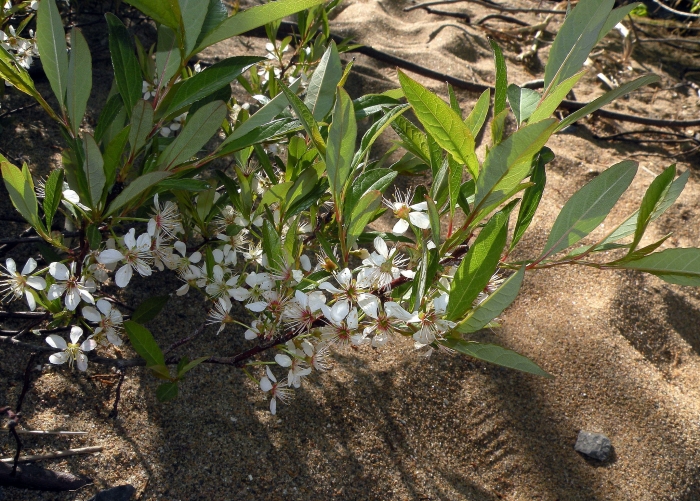Eastern Sandcherry
(Prunus pumila var. depressa)
Eastern Sandcherry (Prunus pumila var. depressa)
/
/

Doug McGrady
CC BY 2.0
Image By:
Doug McGrady
Recorded By:
Copyright:
CC BY 2.0
Copyright Notice:
Photo by: Doug McGrady | License Type: CC BY 2.0 | License URL: https://creativecommons.org/licenses/by-nd/2.0/ | Uploader: Doug_McGrady | Publisher: Flickr |










Estimated Native Range
Summary
Prunus pumila var. depressa, commonly known as Eastern Sandcherry, is a deciduous shrub native to the sandy shores and dunes around the Great Lakes and in parts of the northeastern United States and Canada. It typically grows to a height of 0.61–1.83 meters (2–6 feet) and is known for its ability to form dense clonal colonies through sprouts from its root system. The Eastern Sandcherry has a compact form with slender branches, and it produces showy white flowers in the spring, followed by small cherries, 13–15 mm (1⁄2–9⁄16 in) in diameter, that ripen to dark purple in early summer. The fruit is attractive to wildlife, including birds.
This shrub is valued for its hardiness and adaptability to poor soil conditions, making it suitable for erosion control on slopes and in coastal areas. It is often used in ornamental plantings for its spring flowers and can be utilized as ground cover or in border plantings. Eastern Sandcherry thrives in full sun to part shade and prefers well-drained soils, although it can tolerate a range of soil types. It requires low amounts of water once established, making it a low-maintenance choice for xeriscaping. Gardeners should be aware that it can be susceptible to pests such as borers and diseases like leaf spot.CC BY-SA 4.0
This shrub is valued for its hardiness and adaptability to poor soil conditions, making it suitable for erosion control on slopes and in coastal areas. It is often used in ornamental plantings for its spring flowers and can be utilized as ground cover or in border plantings. Eastern Sandcherry thrives in full sun to part shade and prefers well-drained soils, although it can tolerate a range of soil types. It requires low amounts of water once established, making it a low-maintenance choice for xeriscaping. Gardeners should be aware that it can be susceptible to pests such as borers and diseases like leaf spot.CC BY-SA 4.0
Plant Description
- Plant Type: Shrub
- Height: 1-2.5 feet
- Width: 2-5 feet
- Growth Rate: Moderate
- Flower Color: White
- Flowering Season: Spring
- Leaf Retention: Deciduous
Growth Requirements
- Sun: Full Sun, Part Shade
- Water: Low
- Drainage: Medium, Fast
Common Uses
Bee Garden, Bird Garden, Butterfly Garden, Low Maintenance, Rabbit Resistant, Showy Flowers
Natural Habitat
native to the sandy shores and dunes around the Great Lakes and in parts of the northeastern United States and Canada
Other Names
Common Names: Sand Cherry
Scientific Names: , Prunus pumila var. depressa, Prunus depressa, Cerasus depressa, Cerasus pumila var. depressa, Cerasus pumila subsp. depressa,
GBIF Accepted Name: Prunus depressa Pursh